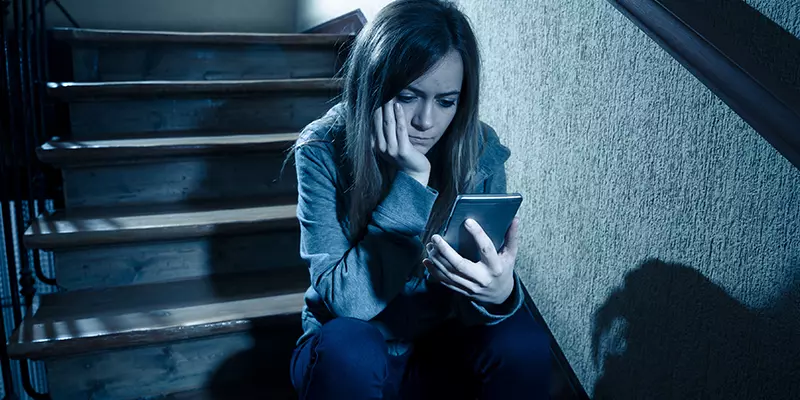
Peer pressure is nothing new, especially among teens and adolescents. The influence peers wield on their social circle has long been associated with driving behavior—both good habits and bad habits. For example, seeing a friend drink, smoke, use drugs, bully others, or binge eat increases the likelihood of engaging in that behavior oneself. Experts call this “social contagion.” Sadly, it also applies to self-harm.
This is especially alarming in light of the dramatic increase in self-injury among teens since the pandemic began. According to an analysis of healthcare claims by FAIR Health, claims for intentional self-harm as a percentage of all medical claims for adolescents aged 13-18 skyrocketed by 99.8% in April 2020 compared to April 2019. Experts suggest the number of teens engaging in nonsuicidal self-injury could continue to increase.
Seeing a friend drink, smoke, use drugs, bully others or binge eat increases the likelihood of engaging in that behavior oneself. Experts call this “social contagion.” Sadly, it also applies to self-harm. Click To TweetWHAT IS NONSUICIDAL SELF-INJURY?
Nonsuicidal self-injury (NSSI) is the act of purposely harming oneself without the intention of taking one’s own life. People who hurt themselves often have a history of adverse childhood experiences, such as abuse, being bullied, childhood neglect, or sexual assault. They may turn to cutting, skin-picking, burning, or other forms of self-mutilation as a way to numb their emotional pain.
NSSI is most frequently seen in adolescents and young adults. Research in Child and Adolescent Psychiatry and Mental Health indicates that 17% of adolescents report at least one incident of self-harm. That’s higher than the 15% of college students who say they have engaged in self-injury at least once, according to a 2011 study in the Journal of College Health. And it’s more than 3 times higher than 5% of adults reporting self-harm. Approximately 65% of those who engage in NSSI are female, but experts suggest the behavior is likely underreported in males.
STUDY FINDS SELF-HARM IS SOCIALLY CONTAGIOUS
Long-standing research shows that among adolescents, exposure to a peer’s suicidal behaviors raises the chances of dangerous copycat actions. Newer findings in a 2020 Canadian study in Acta Psychiatrica Scandanavica indicate that having knowledge of a friend’s nonsuicidal self-injury is significantly associated with an adolescent’s own involvement with self-harm, suicidal thoughts, and suicide attempts.
In this study, researchers administered the following 3 questions about NSSI and suicidal behavior to 1,483 Canadian adolescents ages 14-17.
- In the past 12 months, did any of your friends deliberately harm themselves but not mean to take their life?
- Sometimes people deliberately harm themselves but they do not mean to take their life. In the past 12 months, did you ever deliberately harm yourself but not mean to take your life?
- In the past 12 months, did you ever seriously consider taking your own life or killing yourself?
Based on the responses, females indicated awareness of a friend’s self-harm at a rate of nearly 3-to-1 compared to males. Compared to boys, girls also reported higher rates of their own engagement in NSSI (girls 11.4%, boys 3.4%), suicidal thoughts (girls 8.5%, boys 4.3%), and suicide attempts (girls 4.8%, boys 2.3%).
SELF-HARM AND MENTAL HEALTH
A wealth of scientific evidence shows that NSSI is associated with other mental health conditions. Among people who engage in self-harm may also struggle with issues such as anxiety, depression, post-traumatic stress disorder (PTSD), borderline personality disorder, substance abuse, eating disorders, dissociative disorders, or obsessive compulsive disorder.
The team of Canadian researchers also analyzed mental health status and its effect on NSSI, assessing any diagnoses for major depressive disorder, anxiety disorders, ADHD, oppositional disorder, or conduct disorder. They found that adolescents who met the criteria for an anxiety disorder or depression were more likely to say they knew a friend who had been involved in self-harming behaviors. Those with some form of anxiety—including certain phobias—ranked highest with 28.6% reporting knowing a friend who engaged in self-injury. Among teens with depression, 20.4% said they knew peers who tried to hurt themselves.
Engaging in NSSI as an adolescent also has detrimental effects on mental health in adulthood, according to findings in a 2020 study in European Child & Adolescent Psychiatry. In this study, researchers followed students in grades 7-8 for 10 years. Compared to youngsters who did not engage in NSSI, those who repeatedly injured themselves as adolescents exhibited significantly higher rates of anxiety, stress, NSSI, and problems with emotional regulation a decade later.
HELPING TEENS PREVENT OR HEAL FROM SELF-INJURY
Preventing and healing from self-harm is possible. Recognizing that NSSI is socially contagious is an important step in identifying an adolescent’s risk for self-injurious behaviors. Providing teens with strategies to handle peer pressure—for example, saying no like they mean it, disagreeing respectfully, or asking questions—can be beneficial in the prevention of this increasingly common problem. It is equally critical for parents to know the warning signs of self-harm, including scars, frequent cuts or bruises, far-fetched tales about how an injury occurred, wearing long sleeves even in summer, carrying sharp objects, declining academic performance, and social withdrawal.
In addition, addressing any co-occurring mental health issues should be part of an NSSI treatment plan. Investigating brain health with functional brain imaging may also be beneficial as it can reveal underlying abnormal activity. A 2019 brain imaging study found decreased brain function in regions of the brain that play a role in emotional regulation. Finding solutions that enhance overall brain health and emotional well-being is key to overcoming nonsuicidal self-harm.
Self-harm, suicidal thoughts and behaviors, and other mental health issues can’t wait. During these uncertain times, your mental well-being is more important than ever, and waiting until life gets back to “normal” is likely to make your symptoms worsen over time.
At Amen Clinics, we’re here for you. We offer in-clinic brain scanning and appointments, as well as mental telehealth, remote clinical evaluations, and video therapy for adults, children, and couples. Find out more by speaking to a specialist today at 888-288-9834 or visit our contact page here.





No Comments »
No comments yet.
RSS feed for comments on this post.
Leave a comment